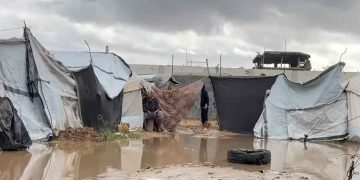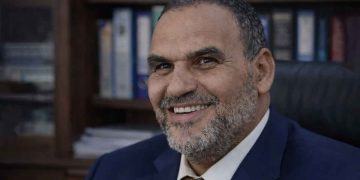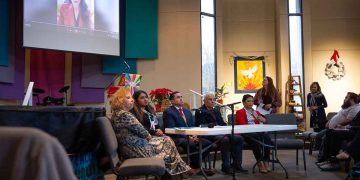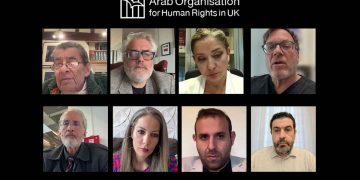Arab Organisation for Human Rights in the UK (AOHR UK) held a webinar on Thursday evening, 13 November 2025, to address Israel’s advancement of the so-called “Death Penalty for Terrorists” bill, which seeks to legitimise extrajudicial executions and institutionalise discrimination against Palestinians. The webinar explored the wider context of Israel’s systematic violations, including torture, sexual violence, and deaths in custody, and examined how this legislation aims to transform decades of unlawful killings into a codified judicial framework that undermines international law and fundamental human rights.
The webinar brought together a distinguished panel of speakers, including Jeremy Corbyn, Member of Parliament of the United Kingdom; Professor Stephen Zunes, Professor of International Security and Foreign Policy at the University of San Francisco; Dr Jeff Halper, Head of the Israeli Committee Against House Demolitions (ICAHD); Dr Lex Takkenberg, Senior Advisor at ARDD and former Director of UNRWA Operations; Milena Ansari, Assistant Researcher in the Israel/Palestine Division at Human Rights Watch; and Erik Warsaw, a U.S. social media influencer. Together, they offered legal, political, and moral perspectives on Israel’s escalating repression and the urgent need for accountability and international action.
In her intervention, Melena Ansari highlighted the alarming reality behind Israel’s advancement of the death penalty bill targeting Palestinians. She noted that the law passed its first reading in the Knesset by a wide majority—39 votes to 16—reflecting an entrenched political will to formalise extrajudicial killings. She stressed that the bill’s wording, conditions, and elements make it explicitly clear that only Palestinians will fall under its scope, particularly as it ties capital punishment to acts allegedly “motivated by racism, hostility, or intent to harm the State of Israel and the Jewish people.” She underscored that this legislative push comes amid an environment where Palestinian lives in the West Bank, East Jerusalem, and Gaza are treated as disposable, and where Israel has engaged for decades in shoot-to-kill policies and extrajudicial executions.
Ansari further explained that the death penalty legislation cannot be separated from the escalating abuses inside Israeli detention facilities. She reported that 77 Palestinians have died in Israeli custody in the past two years, with autopsies revealing pervasive medical neglect, untreated chronic illnesses, injuries sustained during arrest, and systemic denial of essential care. She cited ongoing documentation by Human Rights Watch, Physicians for Human Rights–Israel, and Palestinian organisations showing torture, sexual violence, rape, denial of food and water, and violent prison raids. She emphasised that this deteriorating environment reflects a culture of absolute impunity, facilitated and encouraged by Israeli officials such as National Security Minister Itamar Ben-Gvir. She warned that moving toward codified executions is a direct extension of this system of abuse and of Israel’s broader apartheid structure designed to dominate and oppress Palestinians.
Ansari stressed that authorising Israeli military courts—which convict Palestinians at rates above 99%—to impose the death penalty eliminates any possibility of fairness or due process. She warned that once the death penalty is applied, there is “no going back,” and its weaponisation against a population already subjected to killings, torture, and genocide would constitute an irreversible assault on the right to life. She also pointed to the political context, noting that Israeli officials are exploiting this bill ahead of upcoming elections, using it as a tool of incitement and domination. She recalled the chilling debate inside the Israeli parliament over whether soldiers involved in the gang-rape of Palestinian detainees should be shielded from prosecution—an example that, she argued, reflects the wider culture of protection given to perpetrators of atrocities. Ansari concluded by calling for unified and urgent action to prevent this law from advancing further, insisting that allowing such a bill even to be discussed would deepen Palestinian dehumanisation and formalise a new level of torture, ill-treatment, and state violence.
In his intervention, Dr Jeff Halper explained that while he was not speaking as a lawyer or a human rights advocate, his analysis stems from his long-standing work as a political activist confronting Israel’s settler colonial system. He stressed that the proposed death penalty law cannot be viewed as an isolated or extreme initiative pushed only by far-right figures such as Ben-Gvir; rather, it is an inevitable expression of the settler colonial logic that has shaped Zionism for more than a century. Halper argued that degradation, dehumanization, violence, genocide, extrajudicial killings, and judicial killings are structural components of this system—not anomalies that can be reformed through individual legal battles. He emphasised that attempts to address the law in isolation amount to “tinkering with the system,” because the entire framework of domination must be dismantled, not merely adjusted.
Halper placed the death penalty bill in the broader context of the current moment, which he described as the stage of pacification in the 130-year settler-colonial project. He argued that this stage reflects a push toward normalization, where Israel seeks the full acceptance of its settler colonial reality by Arab states, the international community, and global powers—evidenced by the Abraham Accords and similar alliances. For normalization to succeed, he said, Israel must secure “industrial quiet,” meaning the absolute suppression of Palestinian resistance in every form. He explained that this is why Israel is engaging simultaneously in genocide in Gaza, mass detention and abuse of Palestinians, settler violence across the West Bank, extrajudicial killings, and assaults on 10,000 Palestinian prisoners. He underscored that Netanyahu’s insistence on “total victory” in Gaza reflects the logic that even one surviving fighter, or even one Palestinian expressing a national identity, is too much resistance for the normalization project to proceed.
Halper connected the death penalty bill directly to the themes of deterrence, dehumanization, and despair, arguing that the law aims to erase Palestinian political identity and humanity altogether. He described deterrence as a tool designed to extinguish not only armed resistance but any expression of Palestinian national consciousness. Citing Ze’ev Jabotinsky’s 1923 idea of the “Iron Wall,” he explained that Israel seeks to force Palestinians into absolute despair, believing they must accept the permanent impossibility of an Arab Palestine. To illustrate the function of dehumanization, Halper referenced historical insights about the Holocaust, noting that systems of mass atrocity require stripping victims of their humanity to enable perpetrators to carry out extreme violence. He warned that the same dynamic underpins Israel’s policies today—from rapes in detention to the framing of all Palestinians as terrorists. In his final remarks, Halper concluded that while human rights advocacy is vital, it cannot dismantle a system built on colonial domination; unless the settler colonial structure itself is confronted and dismantled, the international community will remain trapped in an endless cycle of reacting to new laws and new atrocities as Israel advances its broader project.
In his intervention, Professor Stephen Zunes emphasized that none of the atrocities committed by Israel—including genocide, torture, extrajudicial killings, and mass imprisonment—would be possible without the central role of the United States. He underscored that U.S. military, financial, and diplomatic support, combined with Washington’s repeated abuse of its veto power, has enabled Israel to carry out large-scale crimes with complete impunity. While noting that Britain and European governments also bear responsibility, he stressed that the “singular role” of the United States in sustaining the genocide in Gaza mirrors past U.S. support for repressive regimes in Latin America, Iran under the Shah, Egypt, Saudi Arabia, and Morocco. He highlighted that what sets Israel apart is the persistent claim that it is a “democracy,” a narrative that allows U.S. liberals who oppose repression elsewhere to continue defending Israel. For this reason, Professor Zunes argued, it is essential that the testimonies and evidence of Israeli atrocities be widely circulated.
Zunes went on to explain that even individuals who identify as Zionists—and who might oppose Netanyahu personally—are increasingly acknowledging certain abuses, particularly settler violence in the West Bank, torture in Israeli prisons, and extrajudicial killings. He described these areas as a potential “weak underbelly” that could be used to shift U.S. policy, especially when the victims include American citizens. He referenced cases such as the killing of Shireen Abu Akleh, a prominent journalist and U.S. citizen, and Rachel Corrie, whose death in Gaza years earlier also spurred widespread outrage. He argued that targeted killings of unarmed people, especially Americans, provoke far greater public reaction than large-scale bombings of civilian neighborhoods—because such bombings are often rationalized with familiar Israeli narratives about “human shields” or the necessities of war.
In concluding his remarks, Zunes highlighted the critical role played by mainstream human rights organizations such as Amnesty International and Human Rights Watch. He noted that their consistent criticism of abuses in countries like Iran, Burma, and Russia demonstrates that accusations of “bias against Israel” are unfounded, especially since they face audits precisely because they also scrutinize Israeli crimes. He emphasized the importance of Israeli activists who document abuses on the ground, protect Palestinian farmers, and expose the reality of occupation. He also stressed the transformative power of video evidence in an era when “everyone has a camera in their hand,” making it harder for Israeli authorities to distort events. Finally, Zunes argued that U.S. public opinion is undergoing a historic shift: for the first time, most Americans oppose military aid to Israel, and more Americans now express sympathy for Palestinians than for Israelis. In his view, this moment presents a real opportunity to mobilize U.S. society against Israel’s executions, torture, and atrocities, and to push for meaningful policy change.
In his intervention, Dr Lex Takkenberg aligned with Jeff Halper in stressing that the death penalty bill must be understood within the broader settler-colonial project that Israel has pursued since before 1948. He described the law as another instrument added to Israel’s expanding “toolbox” for the erasure of the indigenous Palestinian population—a process advanced through displacement, elimination, and killings that culminated in the Nakba and expanded further in 1967. Although Israel has long retained the death penalty in its legal system, he noted that it has avoided using it against Palestinians as a judicial measure, largely due to objections within Jewish law. Instead, Israel has relied on widespread extrajudicial killings, making this new bill a dangerous and unprecedented expansion of judicial power intended to target Palestinians explicitly.
Dr Takkenberg further warned that the legislative path of the bill—pushed through rapidly, with Knesset votes shaped by absent members—indicates that it may be adopted quickly. He highlighted particular concern over discussions about retroactive application, meaning that Palestinians already serving long sentences could have their punishments converted to death sentences—an extreme and legally “unheard of” step that underscores how Israel is operating inside a political and legal “bubble,” increasingly detached from its own stated values and from basic principles of international law. He emphasized that Israel has no legal authority to enact such laws in the occupied Palestinian territory, including Gaza, the West Bank, and East Jerusalem. He cited three successive advisory opinions from the International Court of Justice, each affirming that Israel must withdraw from the OPT, dismantle its apartheid system, remove settlers, and cease imposing domestic legislation on occupied territory.
In concluding his remarks, Dr Takkenberg stressed that the death penalty bill must also be viewed within the context of international complicity. He referenced Francesca Albanese’s latest report, which argues that while Israel is the direct perpetrator of the genocide in Gaza, it is simultaneously a collective crime enabled by the United States and roughly sixty other states. These states have supplied weapons, provided political cover, diluted UN resolutions, and maintained trade, academic, cultural, and sports links that sustain Israel’s system of apartheid and settler-colonial domination. He emphasized that third-country responsibility is legally binding: states that enable Israel’s violations bear state responsibility, and individual political leaders may face criminal responsibility for shielding Israel from accountability or continuing arms transfers. As Western leaders become increasingly aware of this legal exposure, he argued, human rights advocates, lawyers, and the global majority must leverage national courts, universal jurisdiction, and political pressure to confront these escalating Israeli atrocities and halt the entrenchment of this new death penalty law.
In his intervention, Erik Warsaw began by noting that even after the so-called semi-ceasefire of October 10, Israeli attacks continued, killing an additional 240 Palestinians on top of the 69,000 already killed since October 7. He stressed that there is no genuine ceasefire, only a delay before violence escalates again, particularly under Benjamin Netanyahu, whom he described as presiding over more than 75 years of unbroken oppression. He argued that Israel’s violence extends far beyond Palestine, pointing to Israeli attacks and destabilisation across Lebanon, Yemen, Syria, and the wider region. He claimed that Israel engages not only in military aggression but in deliberate economic sabotage, referencing Syria and Libya as examples of states whose economies were functioning prior to external interference. According to him, Israel systematically suppresses the economic and political power of neighbouring countries to maintain regional dominance and prevent any future challenge.
He continued by arguing that these patterns of aggression and suppression force a fundamental re-evaluation of long-held political assumptions. He stated that he once believed a two-state solution was the only realistic approach, but the events since October 7 had led him to abandon this view entirely. He now believes that only a single Palestinian state and complete decolonization of the region can provide a durable solution. He questioned whether Israel has “the right to exist in the Middle East,” suggesting instead that the state could exist elsewhere, even proposing sparsely populated regions such as a “Russian oblast” as potential alternatives. He argued that maintaining Israel in its current location, given its decades-long record of regional violence, suppression, and destabilisation, is “naive and idealistic,” and that genuine peace cannot be achieved by keeping a state that continually undermines the rights and security of its neighbours.
In concluding his remarks, Warsaw argued that Israel’s influence within the United States—politically, economically, and culturally—has become excessive, affecting American politics, media, education, and business in ways he described as “absurd.” He said Palestinians themselves have lost trust in the two-state solution because they fear any future Palestinian state could be governed by a puppet leader, similar to Mahmoud Abbas, installed or controlled with external backing. He warned that Palestinians would remain oppressed even under a nominally independent state if its leadership were beholden to Israeli or foreign interests. Finally, he described Hamas as a resistance movement, referring to its fighters as “heroes” defending their people, and predicted that history will remember Hamas positively while condemning what he called “the Zionists” for their actions. He argued that the unfolding events require the world to fundamentally reassess not only Israel’s political conduct but also its place in the region.
In his intervention, Jeremy Corbyn, Member of Parliament of the United Kingdom, began by highlighting the unprecedented and openly discriminatory nature of Israel’s proposed death penalty law. He recalled a conversation in Parliament in which a colleague noted that he could think of no legislation in the world that imposed the death penalty exclusively on one group of people for acts committed against another. Corbyn responded by pointing to a historical precedent — the 1871 Criminal Tribes Act, enacted by the British in colonial India — describing it as one of the most grotesque examples of racist colonial superiority. He argued that Israel’s legislation follows the same colonial logic, targeting Palestinians alone and formalising a system of racial domination.
Corbyn then stressed that the law cannot be separated from the broader political trajectory under Benjamin Netanyahu. He warned that the Israeli government is moving aggressively toward a “Greater Israel” project defined by the permanent occupation of the entire West Bank, Gaza, and expansionist ambitions into neighbouring countries. He rejected the idea that recent ceasefire lines in Gaza could serve as a basis for stabilisation, noting that the ceasefire had already been violated and that Israel continues significant physical occupation of the Strip alongside routine bombardments. This death penalty bill, he said, must be understood as yet another mechanism legalising genocide, entrenching settler violence, and enabling further crimes against Palestinian communities.
Corbyn emphasised that the Israeli government’s only consistent policy is the intensification and deepening of the occupation, a point he said was echoed in his conversation with Ofer Kasif, a left-wing Knesset member suspended for supporting Palestinian rights. Against this backdrop, he argued that the global campaign opposing Israel’s actions is essential — particularly efforts to end arms transfers, military cooperation, and security collaboration. He criticised the failure of major trading partners, especially the United States and EU states, to impose meaningful economic sanctions, despite overwhelming public mobilisation across Europe demanding action. He noted that the United States is becoming increasingly isolated in its unconditional support for Israel, while European governments are slowly shifting under the pressure of mass demonstrations.
Corbyn stressed the urgent need to keep international attention focused on Gaza and the occupied West Bank, warning that the illusion of a “claimed” ceasefire creates dangerous complacency. He insisted that global solidarity must prioritise immediate humanitarian assistance, but must also affirm Palestinian identity, culture, and the right to survive as a people. He noted that the scale and brutality of Israel’s actions since 2023 have mobilised global public opinion at unprecedented levels, creating new opportunities for international pressure. In the United Kingdom, he reaffirmed his commitment to ending arms sales to Israel, halting security cooperation, stopping the production of F-35 components in Britain, and defending the civil liberties of activists prosecuted under counterterrorism laws for Palestine-related protest.
He described attending court hearings for British activists charged under terrorism legislation merely for holding Palestine Action placards — a phenomenon he called “utterly absurd.” He suggested that the repeated adjournments of these cases may indicate that the government expects to lose its own upcoming High Court challenge over arms exports to Israel. Corbyn also expanded the discussion to the Abraham Accords, warning that they serve to normalise Israeli apartheid while masking the occupation and ongoing war crimes. He drew attention to the role of regional actors, including the United Arab Emirates, whose military involvement in Sudan raises serious questions about its coordination with Israeli arms suppliers. He argued that solidarity must therefore extend not only to Palestinians but also to communities throughout the Arab world resisting normalization.



























